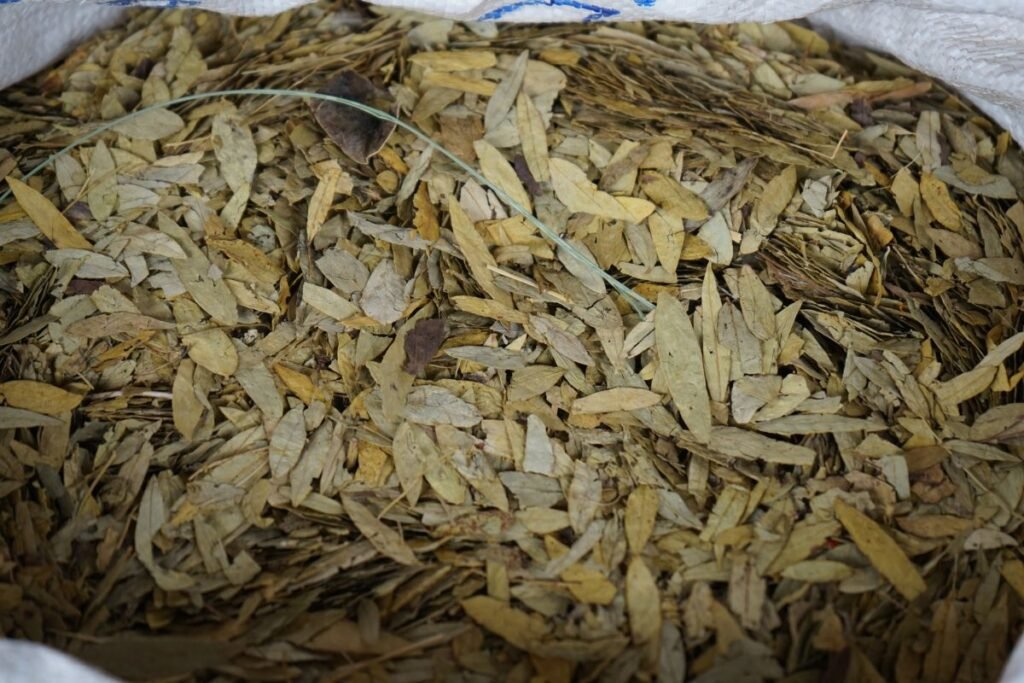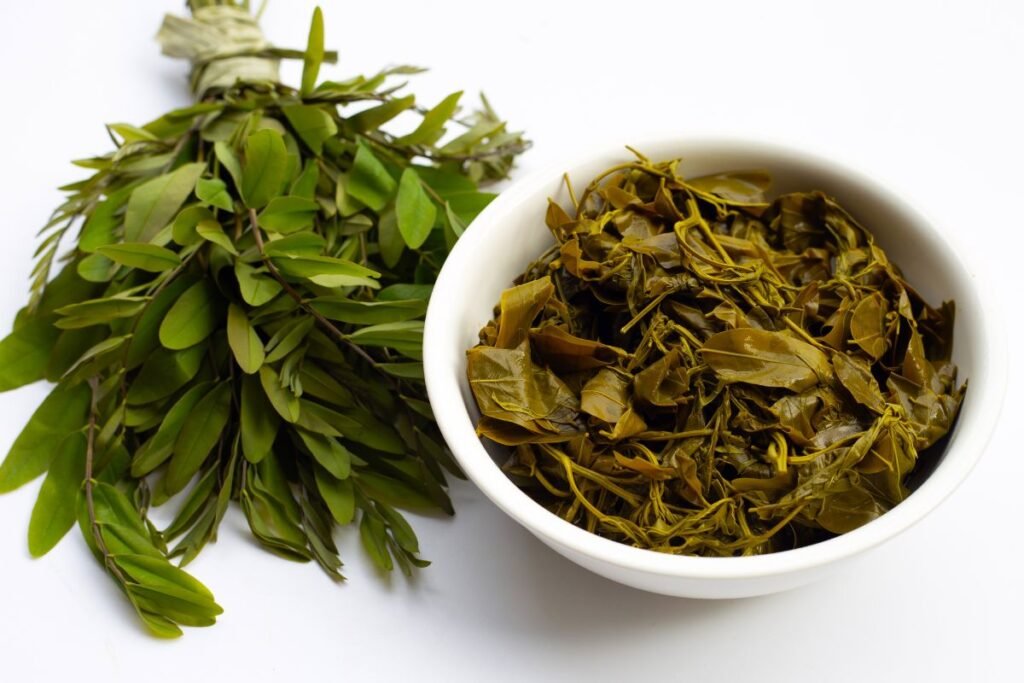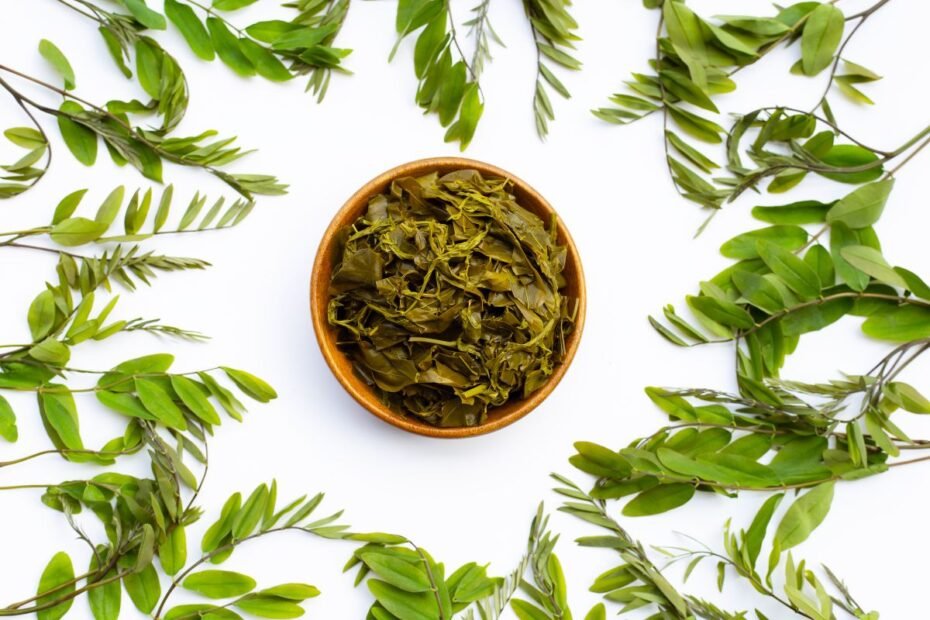Alexandrian Senna (Senna alexandrina), is a member of the legume family (Fabaceae). This plant naturally distributes in northern and eastern Africa (Egypt, Nubia, and Sudan) and is cultivated in India and Pakistan. It does not grow naturally in Europe, but people can grow it in a pot under the right conditions. And you know what? You can make bitter-tasting senna tea from leaves. You may help yourself with senna tea benefits to reduce constipation, make a hair mask, or improve skin condition!
Senna is a widely branching shrub that grows up to 2 meters tall. Its branches are straight and erect, with lanceolate leaves on both sides. It produces yellow, five-petalled flowers concentrated at the tips of the shoots. The fruit is a flat pod with six seeds.
The leaves and pods of senna have been used for medicinal purposes for millennia. Modern medicine supports its benefits in treating certain conditions of the body.
The pods and leaves are used to make medicinal preparations. People harvest the leaves before the plant starts to flower and collect the pods in autumn when the seeds ripen. They dry the raw material in a sunny shed or outdoors.
People may also buy senna leaf raw materials in pharmacies or other specialized outlets. Dried senna leaves are the most commonly used. However, powdered senna leaves are also available.

Benefits of Senna Tea and Preparations
The old plant contains a wide range of nutrients: zinc, calcium, potassium, magnesium, sodium, and copper, as well as carbohydrates, protein, fat, and fiber. The active substances of senna that confer its medicinal properties are polysaccharides, salicylic acid, anthraquinone glycosides, and flavonoids (camferol).
Since ancient times, the leaves and pods of senna have been used as a laxative and intestinal cleanser. This is the primary purpose of senna’s preparations in folk and traditional medicine.
The anthraquinone compounds in senna leaves stimulate intestinal peristalsis, balance the absorption of water and salts in the intestine, soften its contents, and facilitate bowel movements. Studies confirmed senna preparations’ effectiveness in the treatment of chronic constipation, irritable bowel syndrome, and hemorrhoids. Senna preparations are also used to cleanse the intestines before diagnostic tests such as colonoscopy.
The scientific evidence showed senna’s cooling, antibacterial, antiparasitic, and sedative properties.
Senna in Modern Medicine
Modern medicine is intensively researching the properties of the senna plant and its potential benefits for the treatment and prevention of various other diseases. Preliminary research results suggest that senna has antiallergen, antioxidant, antiseptic, and analgesic properties. These tentatively investigated properties may make senna advantageous in many areas in the future.
- It can prevent the formation of cancer cells.
- Senna supports healthy liver function.
- This plant may be beneficial in the treatment of external skin diseases.
- It may help treat rheumatoid arthritis, gout, and intestinal worms.
- This tea may have a blood-purifying effect.

Senna Tea Benefits and Its Variations
Senna tea is a therapeutic drink, which treats specific health problems. It is most often the first remedy for constipation. This tea is used to treat chronic constipation and hemorrhoids. Other benefits of senna tea are using it as an additional cleansing agent before medical procedures or for weight loss.
This tea is not intended for everyday use. Unnecessarily drinking it too often can cause side effects.
To make senna tea, you need:
- ½ teaspoon of senna leaves
- 200 ml of water
Place the raw material in a cup and pour boiled, slightly cooled water over it. Cover the cup and leave it to steep for 10–15 minutes. You can remove senna leaves from the cup before drinking.
You may also steep senna in cold water and left to steep for 10–12 hours. Just strain the tea and drink.
Senna leaf tea has a bitter taste. Try to mix it with green tea for a more pleasant aftertaste. Also, you may add a little honey.
Senna Leaf Tea with Ginger
Ingredients:
- 1 teaspoon of senna leaves
- about 5 g of fresh ginger
- 250 ml of water
Place in a bowl the senna leaves and grated or finely chopped ginger, cover with water, and boil. Remove from the heat, and leave to stand for 15 minutes. Then strain and drink it hot in small sips.

Senna Leaf Tea Benefits The Skin and Hair
The antiseptic substances in senna leaves can help treat external skin conditions caused by infections or fungi. You can make an ointment for external use from powdered senna and vinegar. However, a doctor should consult you before using this remedy on the skin.
Also, try to make and test a hair mask from senna leaves. It gives shine and volume to the hair and makes it vigorous.
To make the mask, you will need:
- 1 tbsp. senna powder
- 1 tbsp. natural yogurt
- water (as required)
- a few drops of your favorite citrus juice, essential oils, or herbal tea
Mix the powder with the yogurt; add the additives of your choice; add the water; and mix well to a smooth, medium consistency. Apply to damp hair in small portions, distributing well over the hair and scalp. Then, cover your head with a hood (or even a plastic bag) and let it dry. After a few hours, rinse your hair well.
Use and Side Effects of Senna Tea
People should stop consuming senna tea for more than 10 days. A two-week break is necessary. Prolonged use of laxatives can be addictive and unbalance the natural function of the intestines. It can also irritate the intestines and cause dangerous diarrhea.
Pregnant females, breastfeeding women, and children under 12 years shouldn’t drink senna tea. It may harm people with intestinal obstruction and stenosis, intestinal atony (loss of muscle tone in the intestines), appendicitis, and intestinal inflammation (Crohn’s disease, ulcerative colitis).

These side effects may occur when drinking senna tea:
- allergic reactions (e.g., itching and rashes)
- abdominal pain, cramps, and diarrhea
- imbalance of salts and water
- discoloration of urine (red-brown color) (harmless; disappears after stopping the tea)
In cases of severe adverse reactions, discontinue consumption of senna leaf tea and consult a doctor.
Interactions of Senna Tea with Medicines
You should note, that senna leaf tea and its preparations may interact negatively with medications. So, if you are taking any of the medicines listed below, you should consult your doctor about taking senna tea.
- Warfarin may increase the risk of bleeding when interacting with senna.
- Digoxin (Lanoxin): Taking senna may increase the risk of digoxin side effects, due to its possibility to decrease potassium levels.
- Estrogens: Senna may reduce the absorption of estrogens and thus reduce their effectiveness.
- Diuretics in combination with senna may cause a decrease in potassium levels in the body.
It is also advisable not to combine senna with sea buckthorn, licorice, aloe vera, and rhubarb, as this may cause excessive laxative effects.
Sources:
- https://www.webmd.com/vitamins/ai/ingredientmono-652/senna
- https://en.wikipedia.org/wiki/Senna_alexandrina
- National Library of Medicine. Medline plus, Senna [Internet] Last reviewed – October 20, 2021 Available from: Senna: MedlinePlus Supplements
- https://www.researchgate.net/profile/Syed-Abbas-11/publication/344571234_Medicinal_Significance_of_Alexandrian_Senna/links/5f80b79da6fdccfd7b552c35/Medicinal-Significance-of-Alexandrian-Senna.pdf
- https://pharmeasy.in/blog/ayurveda-uses-benefits-side-effects-of-senna/
- https://healthembassy.co.uk/en/leaves/109-senna-leaves-tea-senna-alexandrina.html
Associative photos from © Canva.

